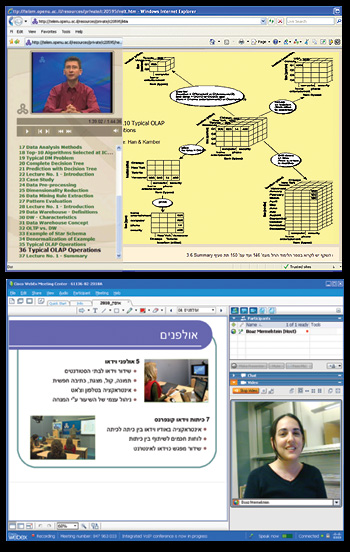| Previous issues | Subscribe |
| INITIATIVES |
|---|
|
|
| TECHNOLOGY |
|---|
|
|
|
|
| STUDENTS |
|---|
| EVENTS |
|---|
| RESEARCH |
|---|
Reshaping Distance Education
"Currently, distance education is undergoing a kind of existential crisis," according to Prof. Sarah Guri-Rosenblit, Director of Academic Outreach at the Open University "whereby the distinct and clear roles of distance education are no longer clear. For some 150 years the essence of distance education was to provide quality higher education to the widest constituency at the lowest possible cost." Based on this definition, distance education has achieved levels of high quality. Thanks to advanced technology distance education institutions have expanded their constituencies, and achieved significant cost benefits. But, these achievements have been double-edged. Distance educators find themselves answering the needs of smaller and smaller groups, eroding the benefit of economies of scale. Digitalization is becoming increasingly expensive. The pool of students is becoming extremely competitive; nearly all higher education institutions reach out to students beyond the boundaries of their campuses through the use of the new technologies, making competition for the pool of students that much more intense. "While these issues may appear grave," Prof. Guri-Rosenblit remarks, "they do offer us opportunities to redefine the role of distance education in the 21st century." Redefining Distance EducationThe field of distance education has become quite muddied. With the advent of digital technologies, more and more universities around the world are maximizing their applications to extend their reach well beyond their borders.Today, new terms have entered the discourse on distance education: e-learning, open education and flexible education, to name a few. These terms are no longer exclusively applied to distance education. For example, e-learning and distance education are not interchangeable. "Most e-learning applications today take place in campus-based universities, and most distance education does not take place through technology," Sarah explains. So what is distance education? At the Open University's "5th Chais Conference on Learning in the Technological Era," MIT's applications of advanced technological tools to reach students in China and Israel, among others, were discussed. Yet, would anyone refer to MIT as a distance education institution? According to Prof. Guri-Rosenblit, "any form of higher education that does not take place on the campus can be defined as distance education. In other words, the moment you reach a student, whether in the outback in Australia, trekking through India, or on an army base in Israel – that's distance education."
Page: 1 2
|
